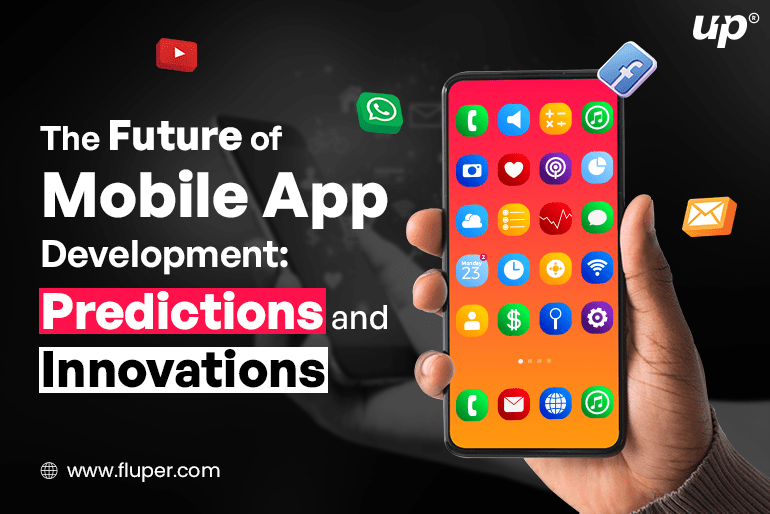Mobile app development has witnessed remarkable advancements in recent years, transforming the way we interact with technology and access information. As technology continues to evolve, the future of mobile app development holds immense potential and exciting possibilities. In this blog, we will explore the upcoming trends, predictions, and innovations that are set to shape the future of mobile app development services.
Rising Demand for Mobile App Development Companies:
The need for reputable and competent app development company is growing as businesses. Increasingly understand the value of having a strong online presence. Businesses are starting to appreciate the potential of customized mobile applications for raising client engagement, increasing revenue, and streamlining operations. It will be essential for organizations trying to stay competitive in the competitive digital market to select the best app development company.
Mobile App Development Services: A Key Business Strategy:
Mobile app development services will become a crucial component of industry-wide business plans. Organizations, from startups to well-established businesses, will take advantage of the capabilities of mobile apps to offer improved user experiences, foster customer loyalty, and raise brand recognition. More and more mobile applications will offer distinctive features and functions that are specifically crafted to meet corporate needs.
Android App Development Services: Dominating the Market:
The mobile app market will continue to be dominated by Android app development services thanks to their large user base and variety of device possibilities. Developers will concentrate on producing cutting-edge applications that make use of the features of the Android operating system and provide seamless device integration. Android apps will offer improved user experiences on a variety of platforms, from smartphones and tablets to wearables and Internet of Things devices.
Integration of machine learning (ML) with artificial intelligence (AI):
The integration of AI and ML technologies will revolutionize mobile app development. Virtual assistants and chatbots driven by AI will advance in intelligence and interactivity, allowing for more streamlined customer support and personalized consumer interactions. In order to deliver individualized recommendations and predicted insights, machine learning algorithms will analyze user data. This will improve app functioning and user engagement.
Experiences Using Virtual Reality (VR) and Augmented Reality (AR)
Mobile app development will open up new possibilities thanks to AR and VR technologies. By superimposing digital content over the actual world, augmented reality (AR) apps will provide immersive experiences that will revolutionize the gaming, retail, educational, and tourism sectors. VR apps will alter entertainment, training, and simulation experiences by transporting users to virtual worlds. These innovations will change how we use mobile apps, enhancing their immersion, engagement, and interactivity.
Internet of Things (IOT) Integration:
Mobile apps will be essential for connecting to and managing IoT devices as they become more widely used. The goal of mobile app developers is to enable customers to control their smart homes, wearable’s, and other IOT-enabled gadgets from a single app by integrating smartphones and IoT devices in seamless ways. Our daily lives will be more convenient, automated, and effective thanks to this connection.
Which Language Is Ideal for Creating Apps?
The ideal language for developing apps will vary depending on a number of variables, such as the app’s particular needs, the platform you’re targeting, the team’s experience, and personal preferences. However, a few of the most used languages for creating apps are:
Java is a popular platform for creating Android apps, and it has a sizable developer community and a wealth of libraries.
Swift: Designed by Apple and mostly used for creating IOS apps, Swift delivers cutting-edge features and improved performance.
Kotlin is a flexible language that can be used to create apps for IOS and Android. As a result of its brevity and security characteristics, Kotlin is compatible with Java.
When creating hybrid or cross-platform mobile applications with frameworks like React Native or Ionic, JavaScript is frequently employed. For the creation of web applications, JavaScript is also commonly utilize.
Microsoft’s C# programming language is largely used to create programmers and games that run on Windows. It is also utilize in the creation of cross-platform mobile apps using Xamarin.
Python is becoming more and more popular in the development of mobile apps. Using frameworks like Kivy or Beware because of its readability and simplicity.
The optimal language will ultimately depend on your individual requirements, the platform you’re targeting, and the ecosystem and resources that language has to offer. When selecting a language for app development, it’s crucial to take into account elements like community support, documentation, performance needs, and the expertise of your development team.
What Mobile Application Development Trends Should You Watch in 2023?
Expect a rise in the use of cloud computing technologies, Internet of Things (IOT) applications, augmented reality (AR) and virtual reality (VR) experiences, and mobile apps that place a greater emphasis on security and privacy in 2023. The future of developing mobile apps will be influenced by these factors. The advantages of outsourcing software development for your company are outlined in “Unlocking the Potential: Harnessing the Potential”
Why Is IOT the Future of Developing Mobile Apps?
Due to its capacity to connect various physical devices and items to the internet, enabling them to communicate and share data with one another, IOT (Internet of Things) is thought to represent the future of producing mobile apps. Mobile app developers may design inventive and clever solutions that offer improved functionality, automation, and real-time data analysis by incorporating IOT technologies into mobile apps. This creates a wide range of opportunities, including those for smart homes, connected cars, wearable technology, and industrial automation. IOT will be a key element in future mobile app development as the convergence of IOT and mobile app development enables the production of seamless and personalized user experiences.
Does App Development Increase?
App development is indeed expanding quickly. People now depend heavily on mobile apps in their daily lives, and there is a growing need for fresh, cutting-edge software. The development of apps is a field that is continually changing and growing as a result of the emergence of technologies like the Internet of Things, artificial intelligence, augmented reality, and virtual reality. Additionally, companies in a variety of industries are realizing the value of mobile apps for connecting with and interacting with their target consumers. As a result, there are many chances for developers and significant growth in app development, which also helps the digital economy as a whole.
What Will the Mobile App Development Industry Look Like in the Future?
More advanced AI-powered apps with personalized user experiences, advanced AR/VR capabilities for immersive interactions, seamless mobile wallet integration. With IOT devices, widespread adoption of cloud-based services for scalability and cost-efficiency. As well as strong security measures to protect user data, are likely to be seen in the future of the mobile application development industry.
Conclusion:
Future mobile app development has a lot of room for innovation and expansion. Businesses will need the assistance of app development companies to fully realize. The potential of mobile apps to boost success and maintain competitiveness. Mobile apps will become more individualized, immersive, and intelligent with the growth of Android app development services and the incorporation of AI, AR, VR, and IoT technologies. Organizations seeking to remain at the forefront of the changing digital landscape must embrace these developing trends.











